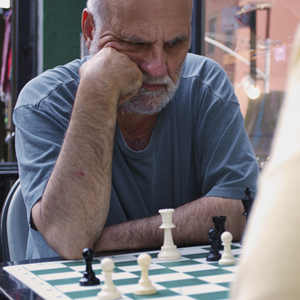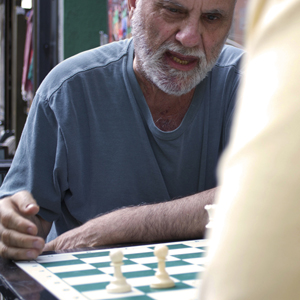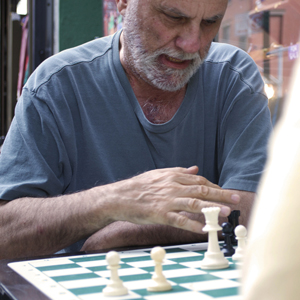I love chess. More importantly, though, I respect chess. And this is an important distinction, because while I love chess, I never play anymore.
Why?
I learned just enough about chess along the way to know that I could never match a true player. And respect for the game now keeps me from playing it. Odd, you think? Let me explain.
The great chess grandmaster, Gary Kasparov, once said:
“The public must come to see that chess is a violent sport! The stakes are very high in an important chess game. When you beat your opponent you destroy his ego; for a time you make him lose confidence in himself as a person. If the general public understood that chess players were plotting to crush one another, don’t you think they’d be interested?”
When you study chess, most people begin thinking it is just a game. It has rules. It has strategies. It’s has tactics. It’s teachable and it’s learnable. But there’s a subtlety to the game that can’t be taught in a book or learned by looking at chess move tablature. The true chess player is pitting everything that they are to win a game. They stake their intellect, their emotions and their souls into every game. They are like gamblers in high-stakes poker, pitting their fortune on a good hand, only the stakes are their own self-respect.
You see, most people look at chess as a classic game with quaint pieces on a simple, checkered board. But chess is a blood sport. Chess is brutal.
I first learned the game from my grandfather. When I was growing up we would frequently spend our Summer afternoons at my grandparent’s house to swim in the pool, and invariably a game of chess would be offered and accepted. It was my one and only exposure to the game, so I latched onto the experiences willingly.
We played the game together for 8 years like this. And during this time I learned a lot of things. I learned, of course, that the game was difficult, because he never went easy on me. I learned about castling when my grandfather moved his rook and his king on the same turn and walled them behind pawns. I learned about en-passant when I tried a standard two space open with my pawn only to forfeit that pawn because I passed a space my grandfather’s pawn guarded. I learned that pawns could be promoted to queen when my grandfather suddenly did so and decimated my board.
But I learned something more subtle during this time. Because in all the years we played the game together, I never won. Not a single game. I learned that chess was not something with which you trifled. A game of chess should not be forfeited lightly.
We started playing together when I was eight. You would think that maybe one time he would have thrown a match. You would think that one time he would tell me I had made a bad blunder and should take back my move. But he never did. He let me lose. Chess was serious business.
I remember one game in particular with great vividness. It was the closest I ever came to beating him. I had my grandfather on the ropes. I had captured his queen and still had my own queen. He had a bishop and a rook, but I had them matched. I remember it all. But what I remember most is how out of sorts my grandfather was. He was visibly irritated. His face, normally jovial, was scrunched and scowling. Our normally good-natured game had turned serious. There was no longer any talk between us. This was not a game. This was a battle.
I was so close to winning in that moment, but I made a few critical blunders during the end game and my grandfather managed to save himself. And I remember clear as day the look of relief on his face. Then he smiled and said, “That was a good game, Bobby.”
That game is what inspired me to study chess in a serious way. I went out and bought a computerized chess board and books on the subject. I began to follow the move-by-move listings of grandmaster games in the newspaper. I learned about all the permutations of the opening games, the vagaries of the middle game and the brute-force tactics of the end games. I had almost tasted victory. I wanted more.
And then one day I had a realization. I was in my 20s and memorizing opening games (most people don’t realize that if you don’t play an opening game to move-by-move perfection, you’ve already lost) when I had the sudden insight that my mental capabilities were not up to the challenge of the game. I can’t put my finger on it exactly. It was’t that I felt unintelligent. Even Kasparov has admitted that being superior at chess doesn’t grant you intelligence in anything else. It was just that I knew in my heart that this was a game I would never be able to play well. I might be able to win a game here and there. I could certainly hope for competence. But that was all. For me, that wasn’t enough.
Chess is exquisitely violent. It is the art of war, played out with excruciating precision. For most it is just a game. But for those who embrace it and understand it, it is much more. This is a game about crushing your opponent mentally. Some grandmasters rant and rail at their opponents to throw off concentration. Others cultivate an icy stare designed to unnerve the person across the board. More than a few grandmasters have gone insane or are now in hiding. Many are anti-social. All have abnormally large egos.
Chess is brutal. Chess if violent. Chess is war.
I will always love chess. I can still watch chess matches with utter rapt attention. And I will always remember fondly those Summer afternoons in my damp swimming trunks, battling against my grandfather. But I no longer play the game. My respect is too deep for chess. It should never be sullied by my mediocre play again.

Robert Knorpp is host of The BeanCast Marketing Podcast at thebeancast.com and is President of The Cool Beans Group, a marketing strategy consultancy based in New York City. He likes laughing even more than breathing. You can follow the madness on Twitter at twitter.com/BobKnorpp.











